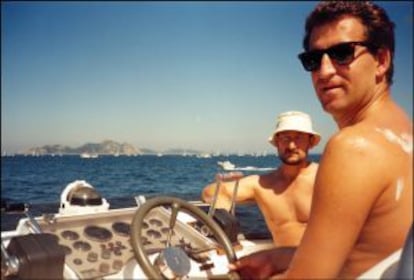Marcial Dorado and the golden age of smuggling in Galicia’s waterways
The man at the center of latest PP scandal gained notoriety in the 1980s

Marcial Dorado, the most notorious of the Galician contrabandists, has always shunned the limelight. Now, when his name and that of Alberto Núñez Feijóo, the Galician regional premier — and tipped successor to Mariano Rajoy for the top job in the Popular Party — are intrinsically interwoven in the national press, Dorado is behind bars. Even though his neighbors and employees knew of the relationship between the politician and the famous tobacco smuggler, Dorado never spoke about it in public.
Before the two men met, Dorado had been the object of police and media attention for years. In the late 1980s he created a company to bring contraband Reynolds tobacco into Spain, in league with Basel-based company delegate Michael Haengui, "Robert the Swiss." After a delivery driver for the organization was locked in a refrigerated van but escaped with his life went to the police, the authorities launched the first big operation against the Galician tobacco mafia in 1983, producing Dorado's first arrest record.
Dorado and 94 other members of the three main Galician trafficking gangs were charged in an investigation lasting so long that it was eventually shelved because the 15-year statute of limitations had expired. However, during the same period Dorado's name was beginning to pop up in European investigations into money laundering.
His links to Haengui and several trips to Basel to negotiate tobacco shipments placed him in the firing line of a French-Swiss investigation known as the "Peseta Connection." It was 1989 and the Swiss authorities were probing a massive foreign currency scam involving 26 billion pesetas, which had been deposited in a company called Porepsa belonging to Haengui.
On June 12, 1990 Dorado was netted in Operation Velvet Crab, a police investigation into Galician drug trafficking that scooped up 54 suspects. He spent a few weeks in prison but was released by High Court Judge Baltasar Garzón as a result of the inconsistency of the slew of allegations made against Dorado by Ricardo Portabales, a detainee turned witness. While people in the small town of his birth, A Illa de Arousa, celebrated, others in the area protested against the decision.
His links to Basel placed him in the firing line of the "Peseta Connection"
Two years later, three years before the photographs published by EL PAÍS of Dorado and Feijóo holidaying together were taken, the provincial government of Pontevedra had begun amassing its own files on the capos of the Galician mafia after some of them made the move into trafficking cocaine and hashish. In one of the voluminous police reports under the appendix "Code White" (individuals who had been placed under investigation), Marcial Dorado is listed as a smuggler with connections both to the construction industry through a real estate company, Ladomar, and to the hostelry business.
The same report cites the Galician rias, the Basque Country and Santander as Dorado's areas of operation and classifies his capacity for maritime trafficking as "very high." It also lists 12 boats used for tobacco smuggling and lists the 35 workers on his payroll.

Of all the tobacco smuggling capos of the era, Dorado was best endowed to turn a profit. Competent and elusive, he tried to escape from his own media attention, convincing himself the press was responsible for his judicial via crucis .
However, phone taps recorded a conversation in which Dorado negotiated the sale of a boat moored at the Greek port of El Pireo in October 2003, implicating his involvement in drug trafficking after the seizure of the second-largest haul of cocaine in Galicia. Dorado admitted he was a smuggler but has always denied any involvement in drug trafficking. "I am the victim of a set-up and they have come at me without any proof," he said at the time.
After he was convicted and sentenced to 14 years in jail, Customs and Excise officers went to work dismantling Dorado's empire and uncovering his vast fortune. In 2009, his entire estate and network of businesses was embargoed, and valued at 12 million euros - a figure that between hidden money and property could be double that, investigators believed.
While the sentence awaits revision by the Constitutional Court, the High Court is preparing a case against Dorado on charges of money laundering. In the interim Dorado launched an appeal to be released on restrictive parole, which has been denied up to this point.
Tu suscripción se está usando en otro dispositivo
¿Quieres añadir otro usuario a tu suscripción?
Si continúas leyendo en este dispositivo, no se podrá leer en el otro.
FlechaTu suscripción se está usando en otro dispositivo y solo puedes acceder a EL PAÍS desde un dispositivo a la vez.
Si quieres compartir tu cuenta, cambia tu suscripción a la modalidad Premium, así podrás añadir otro usuario. Cada uno accederá con su propia cuenta de email, lo que os permitirá personalizar vuestra experiencia en EL PAÍS.
¿Tienes una suscripción de empresa? Accede aquí para contratar más cuentas.
En el caso de no saber quién está usando tu cuenta, te recomendamos cambiar tu contraseña aquí.
Si decides continuar compartiendo tu cuenta, este mensaje se mostrará en tu dispositivo y en el de la otra persona que está usando tu cuenta de forma indefinida, afectando a tu experiencia de lectura. Puedes consultar aquí los términos y condiciones de la suscripción digital.








































